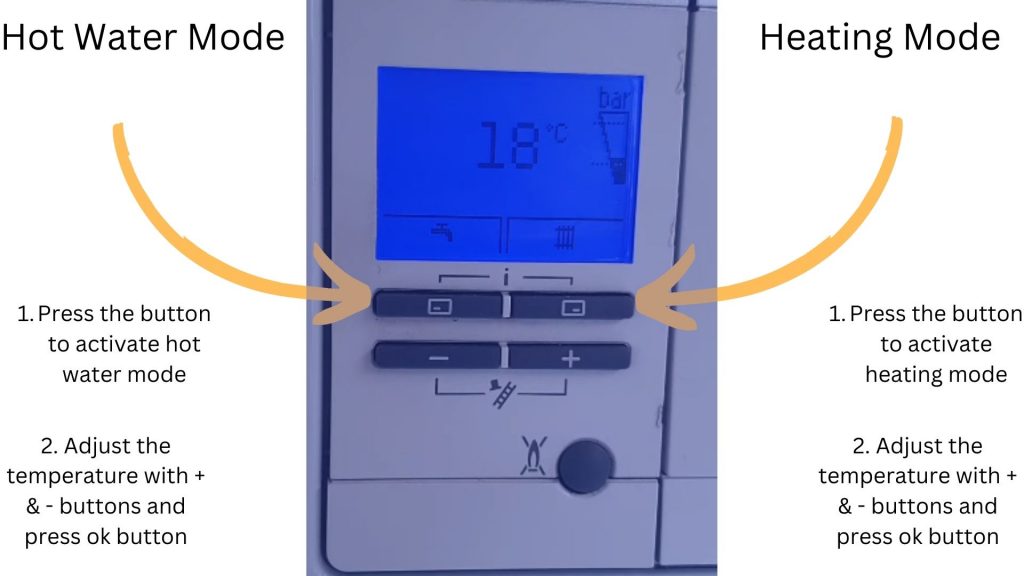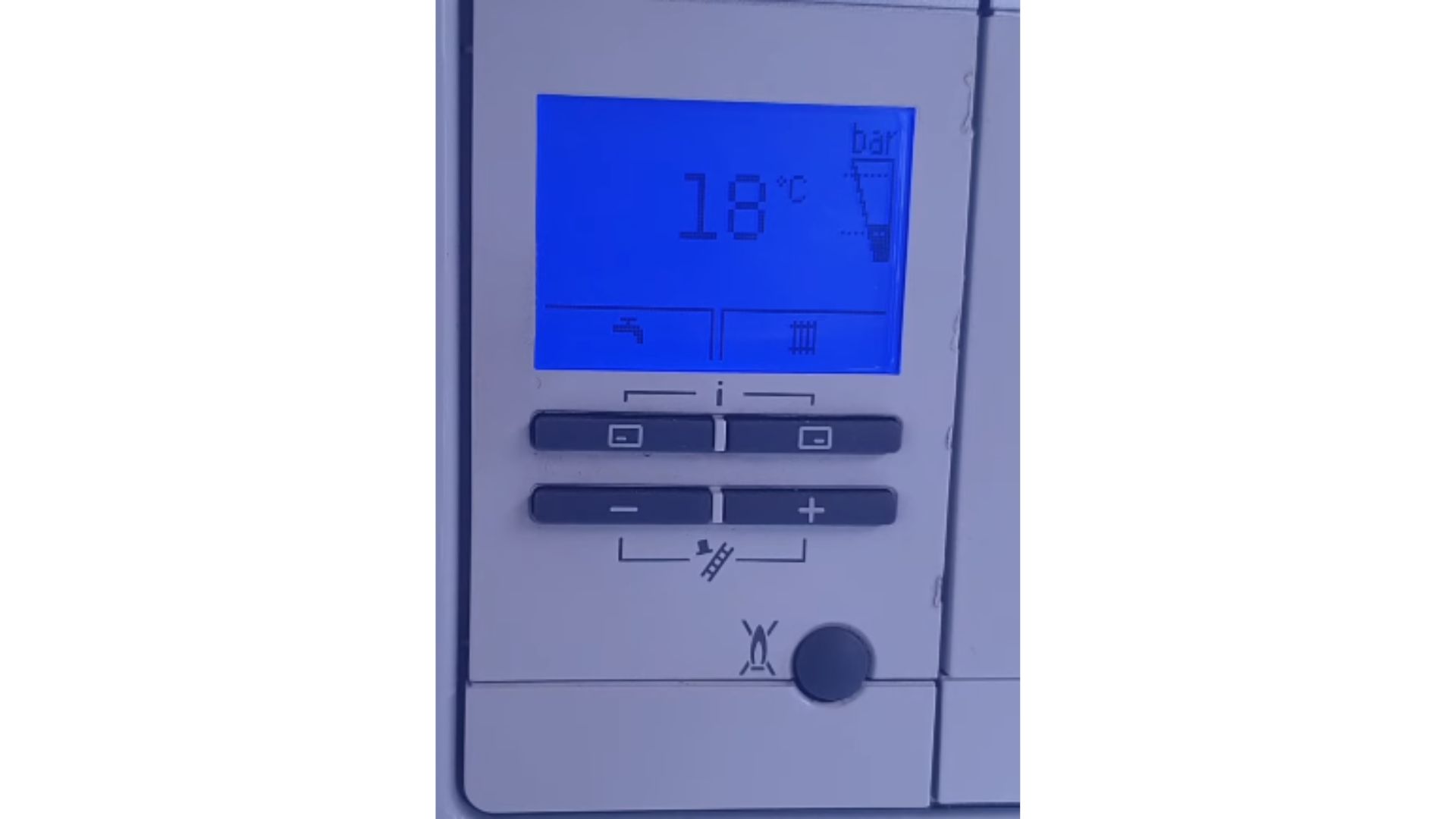‘Combi Boiler’ is short for ‘Combination Boiler.’ It combines central heating with a water heater. Combi boilers are compact because they don’t rely on separate water tanks. They get water directly from your home’s water supply. The heat they generate warms the water. Adjusting a Vaillant combi boiler’s temperature is not easy because you must find a balance between comfort and efficiency.
What Temperature Should A Vaillant Combi Boiler Be Set At? You should set the Vaillant combi boiler at 60 degrees for the water (not below that) and 75 degrees for the boiler.
D.R. Plumbing and Heating has identified 18 – 20 degrees as the optimal temperature for a conventional household. Those figures rise to 22 – 23 degrees in homes with the elderly.
You can increase or decrease the temperature, depending on the situation. For instance, the kitchen is often warmer than other rooms because of the cooking implements it houses. Therefore, it has less extensive heating requirements. On the other hand, the bedroom has demanding heating requirements because many homeowners prefer to sleep in a warmer environment.
These considerations will influence your decisions once you start adjusting the boiler’s settings.
65 degrees C is more than adequate for the water, especially for homes with young children. The last thing you want is to scald them. However, the Viessmann platform has warned against setting the temperature below 60 degrees C because it increases the risk of Legionnaires’ disease.
Lower temperatures may permit the bacteria that cause Legionnaires’ disease to thrive in the cylinder. Keep the tap water temperature below the radiator output temperature but not so low that it threatens the health of your loved ones with a dangerous form of pneumonia.
Efficiency matters because it affects your utility bills. People raise their settings to the highest temperature because they want to improve conditions as quickly as possible. But according to Baxi, elevating the settings to the maximum temperature decreases the efficiency by 20 percent or more.
This is especially true in the winter. You don’t keep warm during winter by raising the temperature to the highest setting. Doing so will overwork the boiler, leading to a malfunction. Many experts recommend the 18 – 20 – degree range because it is the optimal temperature for central heating.
It guarantees satisfactory comfort. You can lower the temperature by two or three degrees in the bedroom. People think warmer conditions in the bedroom will lead to more comfort, but that is not true. Temperatures as low as 16 degrees C are more than adequate for most people to sleep comfortably.
The Heating Hub encourages consumers to take a trial-and-error approach where they experiment with different temperatures until they find a setting that keeps them warm while maintaining their bills at manageable levels.
How Do You Set The Temperature On Vaillant Combi Boiler?

Modern boilers are easier to adjust than their older counterparts. They have a control panel and a display that shows your adjustments. You can change the temperature in increments of 1 degree C.
To activate water heater mode:
- Press the water heater mode button
- Adjust the temperature with the + and – buttons
- Press ok button
- Press back button
To activate the central heating mode button
- Press the radiator button
- Adjust the temperature with the ‘+’ and ‘-‘ buttons
- Press ok button
- Press back button
Watch this video to know more in detail
Don’t expect every Vaillant model to offer the same configuration of controls. Refer to the manual if you need clarification. Some systems offer separate buttons and controls for the radiator and hot water temperatures.
Things To Consider Before Setting Temperature On Vaillant Combi Boiler
There is no ideal temperature for a Combi boiler. If you need help finding a setting that suits you, consider the following:
1). The season matters to an extent.
Many people raise the settings to the maximum temperature during winter to compensate for the low ambient temperature. But that is a mistake because you are more likely to overwork the boiler.
65 degrees C is a decent starting point. Many homes can survive at that temperature in the winter. However, you can raise it a few degrees higher. Keep efficiency in mind. Summer is less complex because you don’t need the radiators during this season.
But experts will encourage you to maintain the settings at 65 degrees C to prevent bacteria from thriving in the water supply.
2). What room are you trying to warm?
Some people want to maintain the same temperature in every room, but that is not feasible because your heating demands will change depending on the location.
Some people seek warmer temperatures in the bedroom. They forget that they will spend most of the night under a blanket. Therefore, you can get away with lowering the temperature by a few degrees.
The kitchen is another room that doesn’t require high temperatures. It has plenty of appliances that generate heat. You can lower your heating bill if you match the temperature settings to the needs of each room.
3). Who lives in your house?
The demands of the inhabitants will influence the settings. According to Mr. Central Heating, older individuals prefer temperatures of 21 degrees C. But that isn’t true for everyone. The elderly inhabitants of your home may favor higher or lower temperatures.
You don’t have to alter the boiler temperature to accommodate one or two people. You can adjust the temperatures in the rooms older people inhabit. The temperatures in the other rooms don’t have to change.
This saves money because the heating system uses more power to maintain higher temperatures. Therefore, if you can afford to lower the temperature in some rooms, you should do so.
4). Frequency Of Use
Is the central heating on at all times, or do you only switch it on when necessary? This matters because it affects the efficiency of the boiler. It seems wasteful to keep the heating on 24/7 because the system expends a lot of energy to keep the temperature at a specific point, even when you’re not home.
It sounds more sensible to use the boiler during those few hours of the night when you’re home. However, a boiler that is off during the day must work harder to raise the temperature of a cold house. The appliance will use significant amounts of energy to create the comfortable conditions you require as quickly as possible.
Both options have pros and cons. Your schedule and financial means will ultimately determine the route you take. Homeowners with the money will keep the heating system running 24/7. Others use intelligent units that activate the heating system an hour or two before they wake up or return home. This allows the boiler to make the necessary adjustments at a slower pace, which is the more efficient approach.
5). Insulation
The insulation shapes the work the boiler must do to meet your heating demands. For instance, you can’t keep the heating system on at all times in a home with poor insulation because the house will lose heat continuously.
Maintaining a set temperature will use more energy. You may also require higher temperatures. It makes more sense to rely on a heating schedule where you only use the boiler when the need arises.
Maintaining a set temperature is only logical in the presence of sufficient insulation. You can use lower temperatures to create satisfying warmth for your home’s inhabitants, saving money in the long run. Boilers in a well-insulated space last longer because they don’t work quite as hard to maintain the set temperature.
How Do I Figure Out That This Temperature Is The Best?
There is no such thing as the best temperature. Any temperature that makes you comfortable is the best temperature. However, I don’t want the hot water temperature to fall below 60 degrees C. Otherwise, you will expose your home’s inhabitants to legionella bacteria.

